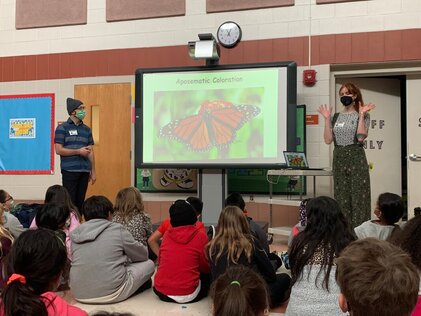|
written by: Demian Nunez and Mike Nan
On October 29th, the UMD Entomology Department’s weekly colloquium was unique. Rather than listen to a speaker from outside the department, Dr. Anahi Espindola presented the survey results of the Diversity, Equity, and Inclusion (DEI) Committee’s department survey. The survey was developed to assess the internal atmosphere in the department, identify positive experiences and actions happening, assess what negative features needed to be addressed, and define actions to be taken to improve the department for all its members.  written by: Lasair ni Chochlain Case studies are one teaching tool that can be utilized to engage students, improve learning outcomes and inclusion in the classroom. Dr. Ally Hunter presented her work exploring the effectiveness of case study pedagogy at a Department of Entomology seminar earlier this semester. Dr. Hunter began this work in her doctoral dissertation, completed at University of Massachusetts – Amherst. Now a postdoctoral fellow at UMass Amherst, she utilizes case studies in her undergraduate science classrooms to promote inclusive pedagogy. The advantage in using case studies in scientific teaching is that the stories, with rich narratives, convey scientific content and concepts while also contributing to the maintenance of situational interest which facilitates undergraduate learning. Here, we dive deeper into the methodology of Dr. Hunter’s educational research, to illustrate how her findings can be applied in entomology classrooms and beyond. In 2020, Kriztina Christmon, PhD student vanEngelsdorp Lab, won AGNR's AgEnterprise Challenge. Now Kriztina serves as CEO of Repurpose Farm Plastic LLC, a company developing sustainable plastic recycling practices in the field of agriculture. The Office of International Affairs at UMD - Global Maryland features Kriztina's interests in agro-plastic recycling, her experience as a new CEO and the aims of the new business.
https://globalmaryland.umd.edu/offices/global/international-student%E2%80%99s-idea-repurpose-barns-becomes-agro-plastic-recycling-company
This news bites: Raupp and Arsenault-Benoit weigh in on what warmer weather means for mosquitos11/10/2021
We're not the only ones enjoying the warm weather this Fall, mosquitoes are too! Over the past several months Professor Emeritus Mike Raupp and PhD student Arielle Arsenault-Benoit have been fielding questions on when mosquito season is expected to end and whether or not climate change is a factor in mosquitos lingering longer than years past.
Raupp in the Diamondback: Entomology professor Michael Raupp explained that temperature increases the speed in which insects develop, grow, molt and capture their prey. In a warming world, winter is shorter, so mosquitoes become active earlier in the year and remain active later in the year. Arsenault-Benoit in the Washingtonian: This matters because mosquitoes “take a lot of their cues from the environment,” says Arielle Arsenault-Benoit, a Ph.D. student in the Department of Entomology at the University of Maryland, who has been collecting and conducting research on mosquitoes for three years. “The temperatures are not very cold for the [mosquito] adults to realize it’s getting to be winter,” Arsenault-Benoit says Raupp in The Washington Post: Raupp mentioned that the mosquito species Culex pipiens, common house mosquitoes that are well-known carriers of West Nile virus, can remain active all year. “Even on warm days in late autumn or winter in D.C., there could be blood,” Raupp said. “These devils live and breed year round in basements, parking garages, and tunnels under cities. They can bubble out and feed when it is warm enough.”  Fig. 1. Dr. Jessica Ware. Source: American Museum of Natural History Fig. 1. Dr. Jessica Ware. Source: American Museum of Natural History Written by: Maria Cramer, Ebony Argaez and Graham Stewart As research entomologists, it’s easy to focus on one tiny area of study. In fact, this is a normal way to do research. So when Dr. Jessica Ware, the speaker for the University of Maryland’s entomology colloquium, talks about her research interests which cover many areas including dragonfly evolution and global migration, termites, and cockroaches, she is often asked why she chooses to study so many different things. Her answer is simple; it’s ok to study more than one group at once. It’s ok to let curiosity about the incredible diversity of insects drive your interests. [Seminar Blog] Reaching maturity? Malaria parasites’ developmental journey through the mosquito11/4/2021
Written by PhD students Arielle Arsenault-Benoit & Minh Le
Malaria is a mosquito-borne illness that has plagued human civilization for millennia (Cox 2010), and continues to infect many people, with over 200 million documented cases in 2019 (World Health Organization, 2020). Preventative interventions and treatments are available for those that can access them, yet according to the WHO, there are 400,000 annual deaths worldwide, and nearly 70% of those are children under 5 years old. Among those interventions are insecticide treated bed nets, residual insecticide spraying, preventative drugs, and treatment with combined drug therapy. Effective prevention and treatment efforts, plus advances in diagnostic testing, have greatly reduced both case numbers and mortality rates, but the development of resistance, including insecticide resistance in the mosquito vector population and drug resistance in the pathogen population present new challenges. A greater understanding of the underlying biology of the pathogen may allow for improved and more targeted interventions in the future. Homeowners, landscapers, and gardeners DYK protecting habitat for overwintering insects can be as simple as leaving leaves lie? Preliminary data from a study conducted by Max Ferlauto, PhD student in the Burghardt lab, shows the number of emerging moths and butterflies are reduced by about 67 percent in areas where leaves are removed. For more on Ferlauto’s project and steps you can take to support overwintering insects check out The Diamondback article.
Congrats on the coverage Max! Share with your networks on facebook and twitter. |
Categories
All
Archives
June 2024
|
Department of Entomology
University of Maryland
4112 Plant Sciences Building
College Park, MD 20742-4454
USA
Telephone: 301.405.3911
Fax: 301.314.9290
University of Maryland
4112 Plant Sciences Building
College Park, MD 20742-4454
USA
Telephone: 301.405.3911
Fax: 301.314.9290


 RSS Feed
RSS Feed




